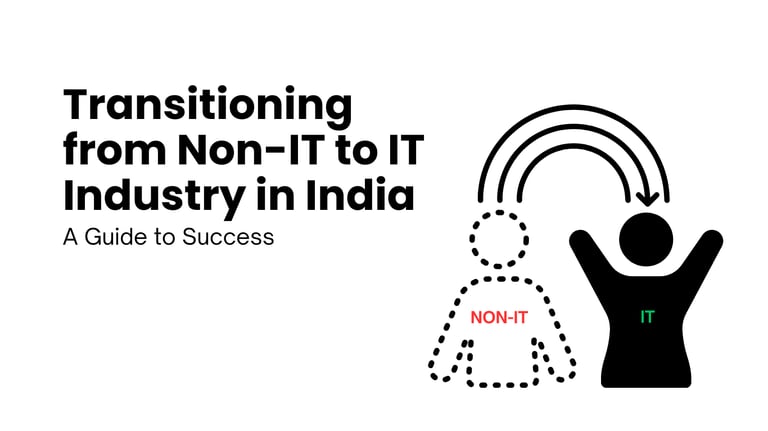Kickstart Your IT Career with MindScripts Tech! 🚀 Expert-Led Training | 3 Days Free Demo | 100% Placement Assistance | Join 1500+ Company Tie-Ups Today! Ready to Succeed? Let’s Begin!
Transitioning from Non-IT to IT Industry in India: A Guide to Success
In today's digital age, the Information Technology (IT) industry stands as a pillar of innovation and growth. With its dynamic nature and promising career prospects, many individuals from non-IT backgrounds are eager to make the switch.
MindScripts Tech
4/3/20243 min read


Is switching from Non-IT to IT challenging?
Indeed! It's difficult! However, it is worth taking on this task because it is genuine and occurs everywhere. That is to say, there appeared to be a very large number of people moving from non-IT sectors into core IT development. Professionals in every field are being persuaded by technology to give it a second chance at success. By embracing new Full stack developer talents, for instance, professionals are drastically changing and hitting it big!
The Information Technology (IT) sector is a key driver of innovation and expansion in the current digital era. Many people from non-IT backgrounds are ready to make the transfer because of its dynamic character and excellent job prospects. If you fall into this category, starting this trip may feel overwhelming, but it is completely doable with the correct strategy and perseverance. We'll discuss the advantages and reasons for making the switch from a non-IT industry to the IT sector in India in this blog post.
1. Determine Transferable Skills: To begin with, evaluate your present knowledge and expertise. Even if you might not have any prior IT expertise, a lot of skills are applicable to many different fields. For example, in IT professions, analytical thinking, problem-solving, project management, and communication skills are highly prized. To show that you're qualified for IT jobs, emphasise these talents on your CV and in interviews.
As an illustration, let's say you've been employed in marketing and sales. Your skills in using CRM software, managing client connections, and analysing market trends can be put to good use in the IT industry in positions like business analyst, digital marketing professional, or customer relationship management (CRM) consultant.
2. Obtain Applicable Certifications and Training: You should think about obtaining applicable certifications and training courses in order to close the gap between your present skill set and the demands of IT positions. Courses in programming languages, software development, cybersecurity, data analysis, and other IT fields are offered by numerous respectable universities. Obtaining these credentials improves your knowledge and increases your marketability on the job market.
As an illustration, suppose you're considering a career in software development. It is possible to sign up for online classes or boot camps that teach Python, Java, or C++, among other programming languages. Earning certifications like Google Certified Professional Cloud Architect or Microsoft Certified: Azure Developer Associate can help attest to your proficiency with cloud computing, an essential ability in today's IT environment.
3. Establish a Robust Professional Network: When making a career change, networking is essential. Attend industry events, conferences, and seminars, and use internet resources like LinkedIn to network with professionals already employed in the IT sector. Talk to people, ask for guidance, and take advantage of these relationships to find out about employment openings and acquire knowledge about the IT industry.
As an illustration, sign up for social media platforms' IT-related groups or forums where experts exchange insights and experiences. Engage in online dialogues, pose inquiries, and demonstrate your eagerness to enter the IT industry. You never know when a relationship could result in a career opportunity or recommendation.
4. Acquire Real-World Experience via Projects: Having practical experience comes in very handy while changing sectors. To obtain hands-on experience with IT activities and technology, take advantage of volunteer opportunities, internships, and freelance projects. Creating a portfolio that highlights your work shows prospective employers how dedicated and skilled you are.
As an illustration, let's say you're considering a career in data science. Using R, Python, or SQL, begin by working on simple data analysis projects. You could perform dataset analyses, produce insightful visualisations, and record your findings in a portfolio. As an aspiring data scientist, you can also establish your reputation by participating in open-source projects or working together on GitHub repositories.
Benefits of Switching to the IT Industry:
Now that we've discussed how to transition into the IT industry, let's explore why it's a compelling choice for career advancement:
Lucrative Opportunities: The IT sector has a lot of employment openings and competitive pay, particularly in developing areas like cloud computing, cybersecurity, and artificial intelligence.
Ongoing Education and Development: As technology advances constantly, there are many chances for education and career advancement. People are encouraged to stay abreast of the newest trends and breakthroughs in the IT business, which cultivates an innovative culture.
Global Accessibility: People with IT skills are in high demand everywhere, which opens up possibilities for distant employment and global career potential.
Various job pathways: The IT sector offers a variety of job pathways that suit a range of interests and skill levels, from cybersecurity and digital marketing to software development and data analysis.
In conclusion, perseverance, upskilling, and networking are necessary to make the move from a non-IT background to the Indian IT sector. People can successfully transition by recognizing transferrable abilities, obtaining pertinent certifications, developing a strong professional network, and earning real-world experience. The IT sector appeals to people looking for fresh challenges and chances for professional advancement because of its bright future, availability everywhere, and opportunity for lifelong learning.

At MindScripts Tech, our mission is to empower individuals through cutting-edge IT education, bridging theory with practical skills. We cultivate innovation, nurture creativity, and prepare our students to thrive in the dynamic IT industry, fostering a globally competitive workforce.
